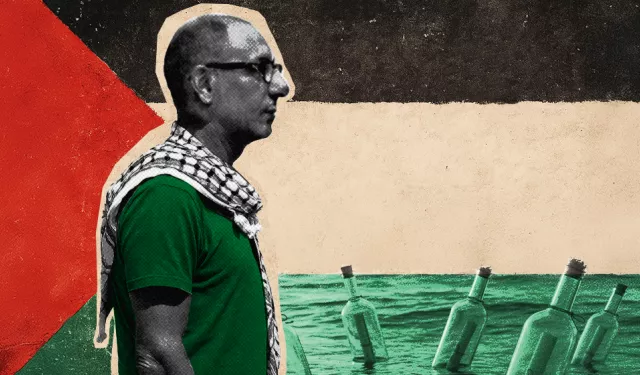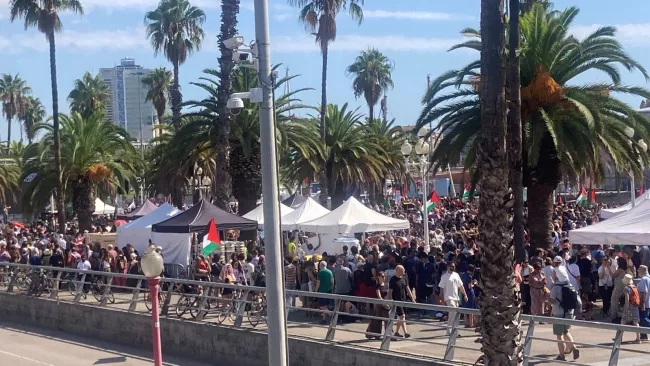
To Palestine| Messages from the sea
I first went to Barcelona in 2002, invited to present my first film. I went full of fresh energy for the screening, and for the chance to visit the famous city on the Mediterranean.
I spent four days there. Aside from the evening of my screening, I spent the rest of the time at the port. I wandered constantly by the sea, taking in what remained of the old fishermen’s cafés and restaurants. I ate there, watched the boats, watched the fishermen, and remembered that I once dreamt of becoming the captain of a large boat—not just a sailor, a captain.
I didn’t visit any of the city’s landmarks, a habit that’s repeated itself in every port city I’ve ever visited. My first instinct is to go and search for the small ports—not the big ones; I don’t care for those. Once I find the little fishing harbors, I stay there until I leave. They become my anchor.
Although I have a thing for boats, I didn’t become a captain or even a sailor, but the obsession remained. I’ve collected a number of miniature boats. I search for them, buy them, keep them.
Only a few years ago did I realize the depth of this obsession. Almost everything I’ve written, every film I’ve made, finished or unfinished, includes boats, or characters who talk about boats. And it’s usually a small boat, carrying fishermen, migrants, or refugees.
Two years ago, my first book came out. On the cover: a paper boat. As my friend Zein Khazzam wrote at the time, in a note celebrating the book “How can you speak of defeat, when that tiny paper boat has already reached shore?”
I realized years ago that one of the reasons I’m working on a book about Youssef Chahine, due out soon, is his own obsession with boats and ports. One of the elements that unites us, even after his death. I later noticed that all my shelved projects, too, were centered around boats or more precisely, the boats are the stage. A year and a half ago, I tattooed a small red Nile boat onto my left hand.
A protest grows on the wooden pier
Since that first visit, I’ve returned to Barcelona many times. And I always repeat the same ritual, except this time. I arrived in Barcelona for the flotilla’s pre-departure training on Wednesday, Aug. 27. It was the first time I wasn’t eager to run to the water, to see the port, or the boats.
This absence of longing didn’t puzzle me. I knew exactly why. Three days later, I would be on a boat, surrounded by the sea, heading for Gaza. Ten days, maybe two weeks, maybe longer. I didn’t know. No one did. The sea could very well become a prison, and the boat a tiny cell inside it.
Still, by chance, I ended up at the port anyway.
I had gone to a small, preliminary demonstration held as a warmup for the Palestinian festival that would take place over the next three days on the harbor, until the fleet departed. The protest began in a small square in the Gothic Quarter, home to both the city hall and the Catalonian government headquarters.
But the small protest grew until it became a massive demonstration marching towards the port. And suddenly, there I was facing the sea again, facing the boats.
Training began. For the three straight days, and because the sessions were held near the harbor—a hall I’ll describe later—we ended each session by heading to the port. To the Palestinian festival that now filled the historic dock: the wooden pier, where boats once docked, long ago, to offload cargoes of timber.
On the final day, Saturday, Aug. 30, after it was confirmed that each of us would indeed board one of the boats, and after I was asked to write dispatches from sea for Al Manassa, I headed to the port that afternoon.
In the middle of the tourist chaos at Barcelona’s central square, Plaça Catalunya, I noticed a young woman in a black T-shirt. On her back was the promotional poster for Daoud Abdel Sayed’s film “Messages from the Sea”.
She was walking with her family. I couldn’t tell if they were Egyptian or from another Arab country. But the moment I saw her shirt—a shirt bearing the poster for a film I love, by a director I love—I felt a sign. A strange, funny sign.
Because I, too, would be sending messages from the sea. Messages very different from the ones Yehya, the protagonist, receives. Mine aren’t about liberation or self-discovery, but about the journey to find a way to Gaza, to stop the famine, the genocide, and the siege.
Messages we wish we didn’t have to send
These messages carry no poetry. The lyricism of Daoud’s world, a world that existed before the genocide. What remains is blunt, immediate, tethered to things with scent and shape. These are messages of catastrophe, of nightmare, not a dream.
In one of the film’s scenes, Yehya battles the sea and fights the storm. If we strip away the symbolism, which I believe Daoud intended—that Yehya is battling the god who determines his fate—then we’re left with something else.
Two nights after seeing that shirt, on the evening of Sept. 2, we were fighting a storm in a small boat. Rain, rough waves, darkness, isolated from the rest of the convoy. No internet. No signal. Most of the group, myself included, had never before spent a night on a small boat in the open sea. And this would be our first: a stormy night, only two hours after we’d left the port of Barcelona.
In our boat, and in all the other boats, most of the volunteers suffered from dizziness and vomiting. For some reason, I didn’t. I don’t know the science behind it, but I was fine. I sat close to the captain, helping him/her navigate, keeping an eye on our supplies on the open deck, trying to make sure we didn’t lose anything. The boat felt so small and fragile, in the midst of that vast dark sea.(*)
Suddenly, I wasn’t just a sailor. I was a first mate. I scanned the sea ahead, checking for obstacles. I pulled ropes and tended to those who were sick. And somehow, the old dream materialized without asking; without wanting.
Yes, I was in a boat, but one I hadn’t wanted to be in. A boat no one should have to be in.
No one should have to travel from the western Mediterranean to the east just because barbarism/the fascist state is committing genocide against the Palestinian people.
The vast hall where we received our training is part of the old, towering main hall of the UGT union. During the Spanish Civil War (1936–1939), it was devoted to the international brigades volunteers, who came from every corner of the globe to wage armed struggle against Spanish fascism. Decades later, it now welcomes another generation of international volunteers; those setting out to break the siege on Gaza, to confront genocide and starvation, and to proclaim: Palestine from the river to the sea.
The world may have changed, but fascism has not.
(*)Al Manassa is withholding certain information that could identify the crew of the Global Sumud Flotilla vessels, for their safety.
This story is from special coverage file To Palestine| We sail, and your hearts sail with us
Sailing to Gaza, we wanted you with us Mr. Chaplin
As thousands gather to see us off at Barcelona’s docks, Chaplin’s spirit echoes. Marching or sailing for Palestine is defending life, children, humanity, and our future.
To Palestine| Messages from the sea
No one should have to travel from the western Mediterranean to the east just because the fascist state is committing genocide against the Palestinian people.
To Palestine| Paths of departure, routes of return
Yousef’s family fled Palestine on foot in 1948. Now, aboard the Global Sumud Flotilla, he attempts his first symbolic return, by sea, towards a homeland he’s never seen.
To Palestine| How can we recover from loving Tunisia?
From Sidi Bou Said to Gaza, Basel Ramsis writes of love, blood, and solidarity. On board the Sumud Flotilla, the journey resumes. Tunisia behind, Palestine ahead.
To Palestine| Fear, resistance, and a Catalana named Carol
It’s not my knowledge of the Arab-Israeli conflict, or of the Palestinian cause or even the latest news from Gaza that gives me a sense of purpose right now.
To Palestine| From boats of death to boats against death
The Senegalese migrant Serigne Mbayé Diouf joins the Global Sumud Flotilla, risking his life in a boat again, this time to stand with Palestinians in Gaza.
To Palestine| From Bahrain to Gaza carrying a father’s legacy
A Bahraini activist sails for Gaza, carrying his father’s legacy while passing it on to his sons, Salman and Salam.
To Palestine| Sailing through fear, carried by hope
As the Sumud Flotilla nears Gaza, Basel Ramsis writes of fear, resolve, and a global movement sailing not just toward Palestine—but against silence, siege, and surrender.
Published opinions reflect the views of its authors, not necessarily those of Al Manassa.

